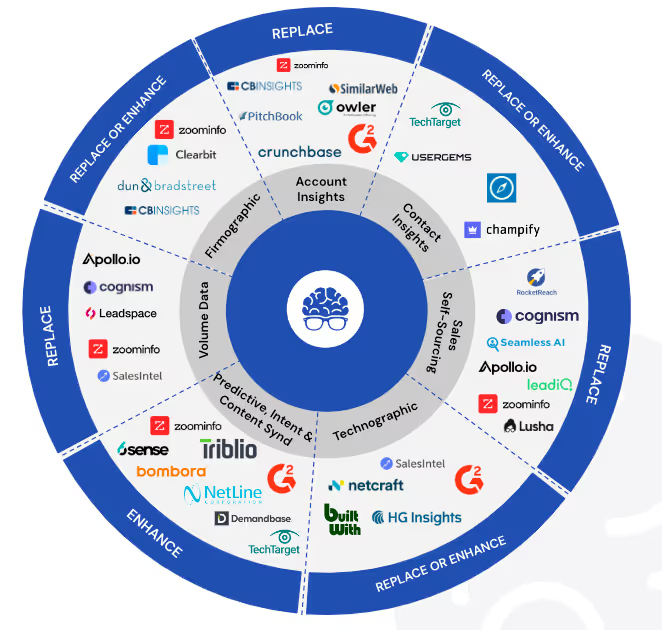In today’s hyper-competitive business landscape, leveraging the right data can be the difference between explosive growth and stagnant performance. For many GTM (go-to-market) teams, prebuilt databases like ZoomInfo and Apollo have long been the go-to resources for account and contact data. While these platforms offer expansive datasets, they often fail to deliver the depth, specificity, and accuracy required by agile sales and marketing teams. As business strategies become more nuanced and data-driven, the cracks in these traditional prebuilt databases are starting to show.
The Problem with Prebuilt Databases: One Size Doesn’t Fit All
Prebuilt databases are designed to serve broad markets, which inevitably means they miss the mark when it comes to industry-specific insights. Here are some of the biggest challenges GTM leaders face when relying on these platforms:
1. Lack of Industry-Specific Nuance
One of the most glaring issues with prebuilt databases is their failure to capture the intricacies of different verticals. These platforms often rely on standard firmographic fields like company size, revenue, and industry codes (such as NAICS or LinkedIn industry categories). But these general attributes leave out critical vertical-specific data points, which are essential for precise targeting.
Take the healthcare industry, for example. When selling into hospitals, academic medical centers, or healthcare providers, GTM teams need far more than just a list of companies labeled as "Healthcare." You need to know:
- The specific departments or units
- The technologies they use
- Their patient volume
- Key decision-makers at various levels (from department heads to purchasing managers)
That’s why healthcare-specific data providers like Definitive Healthcare exist—they provide tailored insights that platforms like ZoomInfo and Apollo simply can’t offer. Without vertical-specific data, your targeting becomes broad and generic, making it impossible to tailor your outreach to the real needs of your audience.
2. Limited Coverage of Sub-200 Employee Companies
As businesses increasingly target smaller, niche markets, prebuilt databases fall short. ZoomInfo and Apollo tend to focus on larger companies, often leaving out critical data for businesses with fewer than 200 employees. Yet, sub-200 employee companies represent a massive opportunity for many B2B companies, particularly in verticals like healthcare, tech startups, and specialized service providers.
By relying on these databases, you’re potentially missing out on thousands of high-potential targets just because they’re under a specific employee threshold. In an era where small and medium-sized businesses are becoming more agile and innovative, failing to target this segment can seriously hinder growth opportunities.
3. International Data Gaps
Most prebuilt databases like ZoomInfo and Apollo excel in providing U.S.-centric data but struggle when it comes to comprehensive international coverage. As companies increasingly expand into global markets, having data on international accounts is crucial to scaling sales operations. The problem is, prebuilt databases often lack the depth and breadth of coverage for companies and contacts in regions like Europe, Asia-Pacific, and Latin America.
International markets come with their own complexities—different languages, regulations, business practices, and market dynamics—which require more than just a shallow dataset. GTM teams targeting these markets need bespoke data that’s curated to reflect the nuances of international business, not a generic list of companies scraped from incomplete or outdated sources.
4. Systemic Data Quality Issues
As data platforms scale, maintaining data quality becomes a daunting challenge. With millions of records and data points, ZoomInfo and Apollo are often plagued by systemic data quality issues. Duplicate entries, outdated contacts, incorrect firmographics, and missing information are all too common. When you’re trying to build a precise GTM strategy, bad data can derail your efforts, leading to:
- Wasted time on dead leads
- Incorrect segmentation and targeting
- Inaccurate territory assignments and sales forecasting
In a world where businesses are moving faster than ever, outdated or inaccurate data is simply unacceptable. You can’t afford to send your reps chasing leads that no longer exist or blasting irrelevant emails to outdated contacts.
Why Prebuilt Data Models Can’t Keep Up with Modern GTM Strategies
The most successful sales and marketing teams today are moving away from rigid, one-size-fits-all data models. Instead, they’re embracing bespoke data strategies that are nimble, adaptable, and curated to fit specific needs. Here’s why the old data models deployed by prebuilt databases are becoming obsolete:
1. Agility is Key
Modern GTM strategies are far too agile to rely on static, prebuilt data models. Markets shift, new competitors emerge, and buyer preferences evolve rapidly. To stay ahead, your data needs to be dynamic and on-demand. Traditional databases simply can’t keep up with this pace of change. Their data updates are often too slow, meaning you’re working with information that might already be outdated by the time it reaches your CRM.
In contrast, bespoke data allows you to curate insights in real-time, ensuring your GTM teams always have the most relevant and actionable data at their fingertips.
2. Personalization Beats Spray-and-Pray
The days of “spray and pray” marketing and sales tactics are over. Customers now expect personalized outreach that speaks directly to their unique challenges and needs. Prebuilt databases don’t allow for this level of personalization. You’re left with generic data that forces you into broad, templated outreach—something that modern buyers quickly dismiss as irrelevant.
Bespoke data, on the other hand, lets you tailor your outreach based on precise attributes, such as a company’s recent funding round, technology stack, or strategic hires. This level of personalization not only increases engagement but also boosts your chances of closing deals.
The Solution: Nimble, On-Demand Data Curation
The key to success in today’s fast-moving sales and marketing environment isn’t just having access to data—it’s about having the right data. Bespoke, on-demand data curation allows you to:
- Segment with precision: Instead of relying on broad firmographics, you can create hyper-targeted segments based on real-time insights.
- Adapt to market changes: As market conditions shift, you can quickly pivot your strategy and acquire new, relevant data to inform your approach.
- Maximize ROI: By eliminating bad data and focusing only on high-value prospects, you reduce wasted effort and increase your marketing and sales ROI.
At the end of the day, businesses need more than just access to data—they need data that’s tailored to their unique needs, updated in real-time, and curated to align with their GTM strategies.
Conclusion: It’s Time to Ditch the Prebuilt Database
While prebuilt databases like ZoomInfo and Apollo offer extensive datasets, they simply can’t provide the level of depth, nuance, and accuracy required by today’s agile sales and marketing teams. From missing vertical-specific data to systemic quality issues and poor international coverage, the limitations of these platforms are becoming all too apparent.
To succeed in a world where GTM strategies are increasingly bespoke, businesses need to invest in nimble, on-demand data curation that goes beyond the basics. With the right data, tailored to your needs, you can target the right accounts, engage with precision, and drive measurable results.
If you’re ready to leave outdated data models behind and embrace the future of bespoke data, LeadGenius can help. Get in touch with us today to learn how our custom data solutions can transform your GTM strategy.




